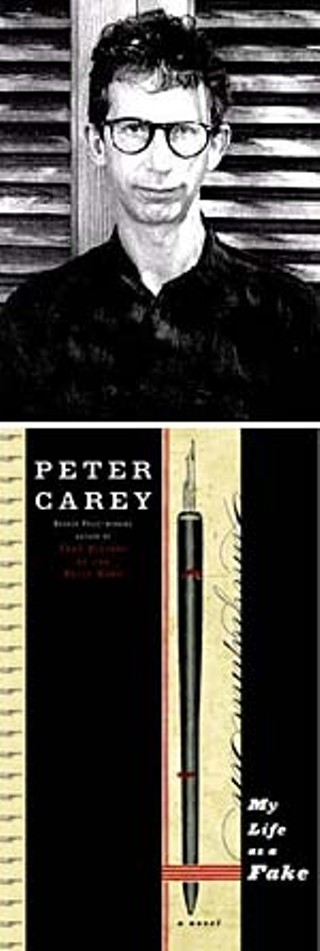2003 Texas Book Festival Preview
In his latest novel two-time Booker Prize winner Peter Carey dares to retell the Frankenstein story by imagining the possibility that poetry can breathe life into a monster. Carey will be at the Texas Book Festival on Sunday, Nov. 9, 11:45am, in the House Chamber.
By Melanie Haupt, Fri., Nov. 7, 2003

My Life as a Fake
by Peter Carey
Knopf, 288 pp., $24
In his latest novel, My Life as a Fake, two-time Booker Prize winner Peter Carey dares to retell the Frankenstein story by imagining the possibility that poetry can breathe life into a monster.
Sarah Wode-Douglass, a middle-aged editor desperate for a literary coup that will pull her magazine out of financial straits, is invited by the poet John Slater to Kuala Lumpur for no particular reason. She agrees to go in order to tease out the secrets of her mother's suicide from the man she thinks was responsible for driving her to the act. Once in Malaysia, however, Wode-Douglass stumbles upon what might be the literary coup of a lifetime when she meets Christopher Chubb, a disgraced Australian poet living in self-imposed exile after his life and reputation are destroyed thanks to his execution of an elaborate literary hoax 25 years prior. Seems Mr. Chubb invented a poet -- poetry, birth certificate, uneducated sister/literary executor, and all -- in order to prove the ignorance and literary boorishness of a childhood friend. Life, of course, gets exceedingly complicated from there, especially once a wild-eyed giant claiming to be Chubb's invented poet shows up and starts wreaking havoc. And much like Dr. Frankenstein himself, Chubb eventually sets off on a goose chase across Southeast Asia, searching for the giant who ruined him. Wode-Douglass finds him in Kuala Lumpur a broken, haunted man who thinks that all he needs to break free from his self-created prison is a good suit and someone to tell his story.
The novel is a writhing ball of secrets, the tangles sometimes impossible to discern; once one thread is pried free, a knottier, more difficult one reveals itself. No one character is without a skeleton in their closet, and all is revealed as the novel progresses. It is this constant unveiling of more and more complicated and tragic secrets that propels the narrative through to its conclusion, and Carey does a masterful job of leaving the reader with perhaps more questions at the end than at the outset.
My Life as a Fake is a very erudite book, chock-full of literary and poetic references both artistic and technical; the reader unfamiliar with Milton (his presence in the narrative is no accident, as it was his Paradise Lost that inspired Mary Shelley's Frankenstein) and Kafka or unable to identify a villanelle or double sestina might lose interest, but Carey gives his readers the benefit of the doubt.
Oscar and Lucinda is still Carey's most beautiful, heartwrenching work, but this ambitious, haunting literary horror-mystery serves to unearth the darkest parts of us all. It is Carey's ability to hold up a mirror to the reader and reveal the malice, greed, and deception therein that makes him one of the bravest storytellers of our time.








